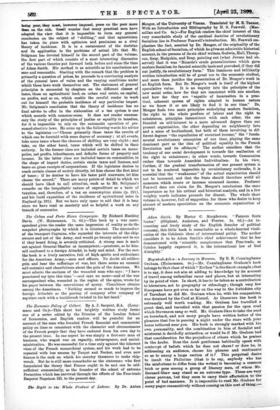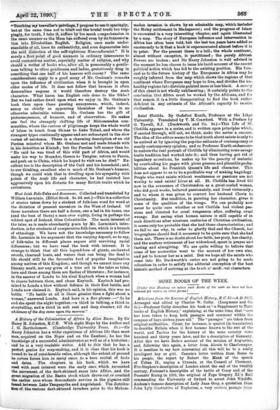Mogreb-el-Ackqi : a Journey in Morocco. By R B. Cunninghame
Graham. (Heinemann. 9s )—Mr. Cunninghame Graham's book belongs to that class of which" Eot hen" is the finest example ; that is to say, it does not aim at adding to knowledge by its account of travel among unfamiliar races and places, but at interesting by its point of view. In short, it has to be taken as a contribution to literature, not to geography or ethnology ; though very few Europeans have got even so far on the way to the forbidden city of Tarudant as did Mr. Graham when he, with his companions, was detained by the Caid at Kintafi. As literature the book is extremely well worth reading. Mr. Graham has travelled a great deal, and travelled with that passion for the open road which Stevenson sang so well. Mr. Graham likes to take the road on horseback, and not many people have written better of the pleasure that lies in passing a night under the stars with your horse tethered near you. His book is strongly marked with his own personality, and the combination in him of Socialist and aristocrat is decidedly attractive, or would be if Mr. Graham had that consideration for the prejudices of others which he praises in the Arabs. Does the Arab gentleman habitually speak with contempt of beliefs which he does not share ? or does he, in addressing an audience, choose his phrases and sentiments so as to annoy a large section of it ? This perpetual desire to insult the Philistine (that is to say, anybody who has the misfortune to differ from the writer) is becoming a common trick or pose among a group of literary men, of whom Mr. Bernard-Shaw may stand as an extreme type. These are very clever persons, but they seem to carry their affectation to the point of bad manners. It is impossible to read Mr. Graham for many pages consecutively without coming on this sort of thing:- Touching my traveller's privilege, I propose to use it sparingly, but at the same time not to blurt out the brutal truth to 0 trip- pingly, for truth, I take it, suffers by too much comprehension in the same manner as the Mass has suffered even by its transmuta- tion into Elizabethan English. Religion, once made under- standable of all, loses its authenticity, and soon degenerates into the arid dialectics of the self-righteous Nonconformist." It is surely a first point of good manners in ordinary intercourse to avoid contentious matter, especially matter of religion, and why should. a writer Of books who, after all, is presumably a gentle- man talking to other gentlemen and ladies, gratuitously drag in something that one half of his hearers will resent ? The same considerations apply to a good many of Mr. Graham's remarks upon the influence of civilisation when it is brought in upon older modes of life. It does not follow that because it often demoralises negroes it ivould therefore destroy the Arab character. What harm has English rule done to the Sikhs ? But we had rather dwell upon what we enjoy in Mr. Graham's book than upon these passing annoyances, which, indeed, annoy us chiefly as appearing blemishes of taste in an otherwise admirable volume. Mr. Graham has the gift of picturesqueness, of humour, and of observation. He makes one feel the strangely shifting life of Mahommedan com- munities, where the custom of pilgrimage keeps the whole world of Islam in touch from Shiraz to Lake Tchad, and where the strangest types continually appear and are submerged in the slow vortex of- existence. There is a charming description of an old Persian minstrel whom Mr. Graham met and made friends with in his detention at Kintafi ; but the Persian left sooner than he. "He said he was tired of this- wild part of Africa, and would make his way to Mogador, thence to Tangier, return to Persia, and push on to China, which he hoped to visit ere he died." Ex- cellent too is the description of the Caid and his household ; and, to our thinking, excellent also is much of Mr. Graham's humour, though we could wish that in dwelling upon his sympathy with points of the Arab life and character, he had insisted less aggressively upon his distaste for many British traits which he caricatures.







































 Previous page
Previous page